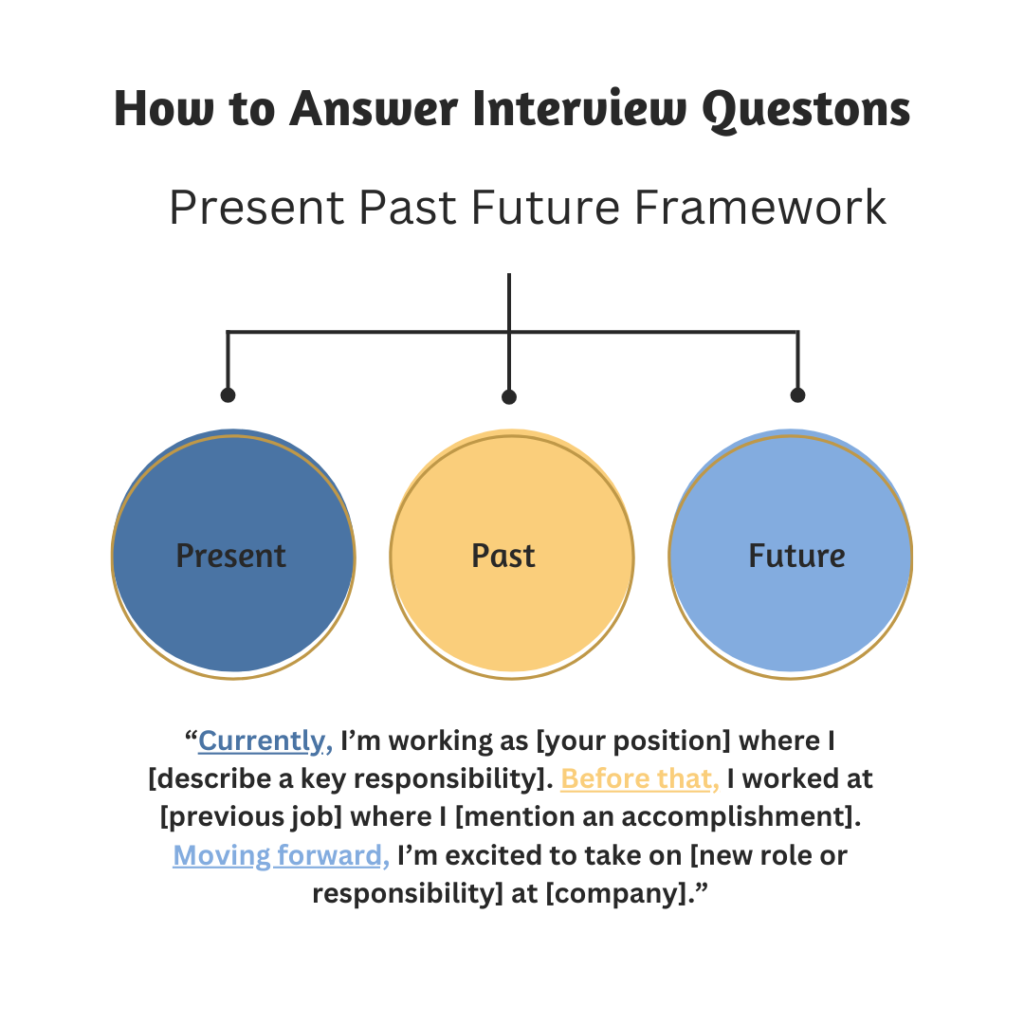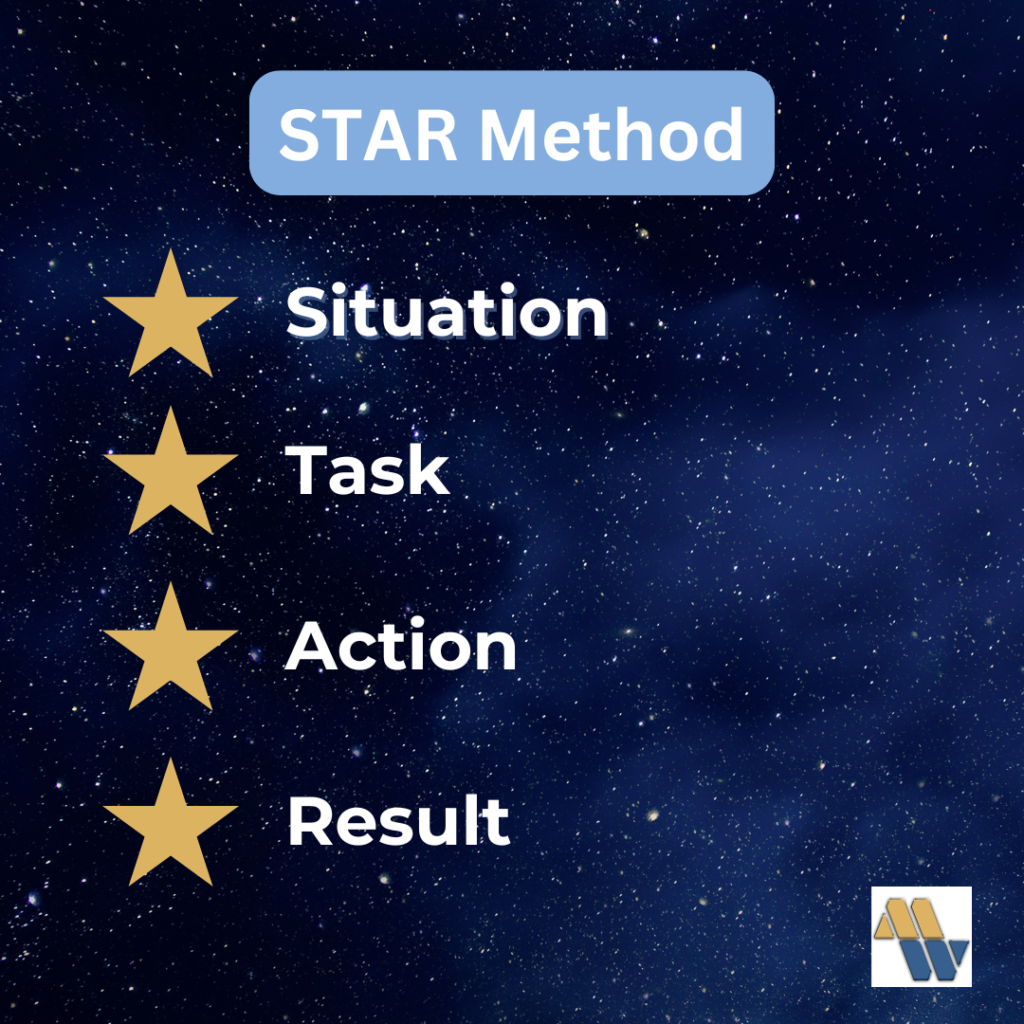Preparing for a job interview can be nerve-wracking, especially when you’re unsure what questions will come your way. The good news is that many interviewers rely on common questions, which means you can prepare in advance.
Explore some of the most frequently asked interview questions and get tips on how to answer them effectively. Whether you’re interviewing for your first job or seeking a career change, mastering these questions can help boost your confidence and improve your chances of landing the role.
1. Tell Me About Yourself
This is often one of the first questions asked, giving the interviewer a snapshot of who you are. While it seems simple, it can be tricky.
How to Answer:
- Keep your answer professional and relevant to the job.
- Highlight your work experience, skills, and strengths that align with the role.
- Structure your response using the present, past, and future framework. (See Infographic Below)

Example Answer:
“I’m currently a marketing coordinator at XYZ Corporation, where I manage digital campaigns and analyze performance metrics. In my previous role at ABC Inc., I honed my skills in content creation and SEO. I’m looking to bring my expertise in these areas to your team, where I can contribute to the growth of your digital presence.”
2. Why Do You Want to Work Here?
Interviewers ask this to see if you’ve done your homework about the company and to understand your motivation for applying.
How to Answer:
- Before the interview make sure to research the company’s mission, values, and recent news.
- Relate their values to your career goals or past experiences.
- Avoid vague answers like “I need a job” or “This company seems cool.” Instead, show genuine interest in their culture or growth opportunities.
Example Answer:
“I’ve been following your company’s recent expansion into eco-friendly products, and I admire your commitment to sustainability. As someone passionate about environmental initiatives, I’m excited about the possibility of contributing to a team that’s making a positive impact.”
3. What Are Your Strengths?
This question allows you to showcase your skills and how they fit the job.
How to Answer:
- Choose strengths that align with the job description.
- Provide examples of how these strengths have benefited previous employers.
- Don’t list generic qualities like “hardworking” without backing them up with examples.
Example Answer:
“One of my key strengths is my ability to communicate complex ideas clearly. In my previous role, I led a project that involved multiple departments, and I ensured everyone stayed informed and engaged. This resulted in the project being completed ahead of schedule.”
4. What Are Your Weaknesses?
This question can feel like a trap, but it’s an opportunity to show self-awareness and a willingness to improve.
How to Answer:
- Pick a real weakness, but one that won’t negatively impact the job.
- Show how you’re actively working on improving it.
- Avoid clichés like “I’m a perfectionist” or “I work too hard.”
Example Answer:
“I tend to be overly critical of my own work, which sometimes leads to me spending too much time on minor details. I’ve been working on managing this by setting more realistic deadlines for myself and trusting my initial instincts more.”
5. Where Do You See Yourself in Five Years?
Employers ask this to gauge your long-term interest in the company and your career ambitions.
How to Answer:
- Tie your goals to the company and the role.
- Show that you’re ambitious, but realistic.
- Avoid saying, “I don’t know” or implying that you plan to leave soon.
Example Answer:
“In five years, I see myself in a leadership role within this company. I’m excited about the opportunities for growth here, and I hope to take on more responsibilities, perhaps even leading a team in the future.”
6. Why Are You Leaving Your Current Job?
This can be a delicate question, especially if you’re leaving on less-than-ideal terms.
How to Answer:
- Keep your answer positive and avoid badmouthing your current or past employers.
- Focus on why the new role is a better fit for your skills and goals.
- Mention any opportunities for growth or new challenges you’re seeking.
Example Answer:
“While I’ve enjoyed my time at my current job and learned a lot, I’m ready for a new challenge. I’m excited about this opportunity because it aligns with my skills and career goals, and I’m eager to contribute to your team’s success.”
7. Can You Tell Me About a Time You Overcame a Challenge?
This is a behavioral question that helps employers see how you handle adversity.

How to Answer:
- Use the STAR method: Situation, Task, Action, Result.
- Choose a relevant example that shows your problem-solving skills.
- Focus on the positive outcome and what you learned.
Example Answer:
“At my previous job, we faced a situation where a major project was falling behind due to resource constraints. I took the initiative to reorganize the team’s tasks and set up more efficient workflows. As a result, we were able to complete the project on time and under budget, which helped us secure a long-term contract with the client.”
8. Why Should We Hire You?
This is your opportunity to summarize why you’re the perfect candidate.
How to Answer:
- Highlight your unique skills and experiences.
- Show how you can solve the company’s problems or meet their needs.
- Be confident but not arrogant.
Example Answer:
“I believe my background in customer service and my ability to handle challenging situations make me a great fit for this role. I’ve consistently delivered results in my previous positions, and I’m confident I can bring the same level of success to your team.”
Step Into Your Next Interview with Confidence
Preparing for common interview questions is one of the best ways to feel confident and ready for your next interview. By practicing your answers and tailoring them to each specific job, you can increase your chances of making a great impression. Remember, interviews are not just about proving your skills; they’re also an opportunity to show how well you’ll fit into the company’s culture.
Ready to take the next step in your career? Start by researching potential job opportunities on Coulee Region Jobs and prepare yourself for success in your interviews. Your dream job is just an application away!


